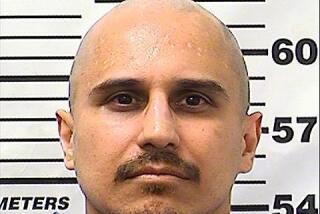A Hate Crime Victim Tells of Lasting Trauma : Law enforcement: The first countywide symposium on violent acts of intolerance is called to defuse a âpowder keg.â
GARDEN GROVE â It has been nearly two years since Mac McCarthy was humiliated, robbed, beaten and left bleeding in his home by two men motivated by their hatred of gays.
As he prepared to relate his experience Wednesday for the first time, he wasnât sure if he would remember all of the details of a painful assault that he has tried to lay aside.
But the memories came flooding back--the color of their shirts, every kick and threat, the feeling that he was going to die--enough emotion to quiet and move a roomful of toughened police officers who had gathered for a symposium on hate crimes.
The daylong conference at the Garden Grove Community Center--the first countywide symposium on an issue of growing concern--drew more than 140 officers, school officials and civic leaders to discuss reporting, prosecuting and preventing hate crimes.
Defined as threats or acts of violence based on intolerance of sexual orientation or racial, ethnic, and religious hatred, hate crimes are a mounting problem in the county.
The Orange County Human Relations Commission, which tracks hate crimes and, along with the Garden Grove Police Department co-sponsored the symposium, had already recorded a record high 35 incidents through June, up from a total of 16 in 1990 and 14 in 1989.
The numbers are expected to increase when the latest figures are released next week at a meeting of a county hate crimes task force, said Human Relations Commission Executive Director Rusty Kennedy.
And the commission is gearing up to investigate what is possibly the latest incident, that of a Latino bus driver who Sunday was the target of racial slurs by a group of youthful Anglo passengers, one of whom slashed the driver on the shoulder as he left the bus.
Speakers at the symposium talked about a growing recognition of the seriousness of the problem in Orange County.
âWe are approaching 2.5 million people here and they are made up of every religion, ethnicity, nationality and sexual orientation,â said Dist. Atty. Michael R. Capizzi. âAs we become more crowded, it becomes harder to take these (differences).â
Gaddi H. Vasquez, chairman of the County Board of Supervisors, pondered what kind of message was sent by the strong showing of former Ku Klux Klan leader and avowed white supremacist David Duke in the Louisiana gubernatorial primary.
Vasquez said community leaders must send their own message by quickly condemning hate crimes and acts of racial harassment.
School officials talked about efforts to make classrooms--the front lines of explosive demographic change sweeping the county--more receptive to students of different ethnic groups and backgrounds.
In recent months, there have been at least five reported violent incidents among students in or near high school campuses that may be race related.
âWe are sitting on an explosive powder keg,â said Sal Garcia, a psychologist with the Garden Grove Unified School District.
He added: âAcademics may have to take a back seat to socialization. If we donât move in that direction, we are missing the boat.â
No speaker, however, carried the dramatic charge of McCarthy, who spoke of the lingering emotional impact of a single hateful act.
It happened on the evening of Jan. 27, 1990, after McCarthy left a gay establishment on Garden Grove Boulevard. Another car pulled alongside his, and the two occupants motioned McCarthy to roll down his window, indicating he had a flat tire.
McCarthy stopped and found that, indeed, his wheel was severely damaged. Then, the two men struck up a conversation with McCarthy. The strangers asked to follow McCarthy to his Westminster home and, concerned about the reliability of his car, he said yes.
They drew McCarthyâs sympathy by relating the difficulty they were finding in coming out of the closet--admitting to society they were gay. Then, they asked if they could come in for a beer. Despite misgivings, McCarthy again assented.
McCarthy said he had begun to feel more comfortable around the two strangers. He went to the bathroom. When he opened the door to leave, he found the two were standing there blocking his entrance.
They knocked him down. As they began to tie his hands and feet with an extension cord, one said, âWeâre not what you think. Weâre not . . . gays.â
They began kicking him and then proceeded to ransack his home, room by room, drawer by drawer.
âWhen they found that I had no money, they became angry,â McCarthy told the audience âThey began to kick me again and I was certain I was going to die. One of them yelled to the other to âget the knife!â and I braced myself for what I thought would be the end.â
And then his phone rang. The two attackers were diverted by the voice of a friend who left a message on McCarthyâs answering machine. As quickly and anonymously as they had entered his life, they left, with a parting threat that he not call the police because they knew where he lived.
McCarthy was able to free himself and did call the police. He was surprised by their response.
âI was frightened at the prospect of the police arriving,â he told the assembly. âI thought I would not be taken seriously, that I would be insulted or blamed. But that did not happen. The officer was very understanding and sat down and comforted me.â
McCarthy required stitches for his cuts, missed two weeks of work, sought psychological counseling and cannot shake a sense of deep resentment because his perpetrators were never caught.
But he no longer blames himself for being a victim.
âI gradually came to realize that I didnât cause this hateful crime to happen to me,â he said.
More to Read
Sign up for Essential California
The most important California stories and recommendations in your inbox every morning.
You may occasionally receive promotional content from the Los Angeles Times.











